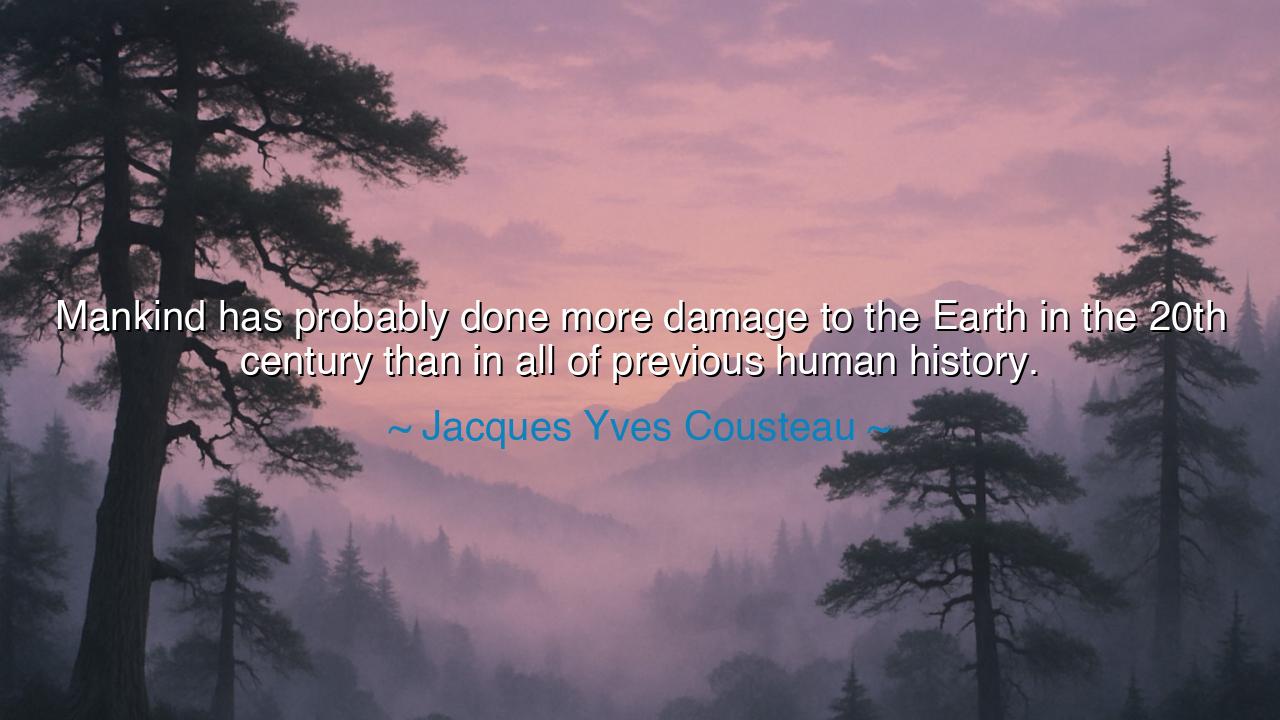
Mankind has probably done more damage to the Earth in the 20th
Mankind has probably done more damage to the Earth in the 20th century than in all of previous human history.






“Mankind has probably done more damage to the Earth in the 20th century than in all of previous human history.” Thus spoke Jacques Yves Cousteau, the great mariner and guardian of the seas, whose eyes beheld both the splendor and the suffering of the living world beneath the waves. His words are not a condemnation alone, but a lament—a cry from one who loved the planet as a mother, who saw her beauty unraveling beneath the hands of her own children. For Cousteau understood what few dared to see: that progress without wisdom becomes a sword turned inward, and that the very species that rose to understand nature had begun to destroy it in its pursuit of comfort, conquest, and pride.
In the long ages before, the Earth endured mankind’s touch in small measure. The plow scarred her fields, the axe felled her trees, but her rivers still ran clear, her air still carried the scent of rain, and her creatures still roamed in multitude. But then came the 20th century—an age of steel and smoke, of power born from oil and fire. The atom was split, the sky pierced, and the sea drilled until its depths bled black. Forests vanished like whispers, glaciers melted like forgotten dreams. In less than a hundred years, humanity did what no thousand generations had achieved: it reshaped the very face of the planet—and not for beauty, but for dominion.
Cousteau, who spent his life among the coral reefs and open oceans, watched this tragedy unfold in silence and sorrow. He saw reefs, once radiant as cathedrals of life, turn ghostly white with death; he saw waters thick with oil, fish poisoned by the unseen hand of progress. The sailor of the deep, who had uncovered the mysteries of the underwater world, found himself a witness to its slow undoing. His words, spoken not with rage but with grief, were meant as a warning—that the seas, the forests, and the air are not infinite, and that the Earth, though vast, is not invincible.
Consider the fate of the Aral Sea, once the fourth largest lake on Earth, teeming with life and sustaining millions. In the name of industry, its rivers were diverted, its waters drained for cotton fields that fed the engines of commerce. Within a single generation, the sea was gone—its bed turned to desert, its ships stranded upon the dust. Where fishermen once sang, now only wind and silence remain. This is the story Cousteau sought to tell: that humanity, in its hunger to build, can forget that it is built upon the living foundation of the planet itself.
Yet his words were not meant to sow despair, but awakening. For Cousteau believed, even amidst ruin, in the power of conscience. He saw that if humanity could destroy so swiftly, it could also heal. The same mind that split the atom could harness the sun; the same hands that felled the forests could replant them. His faith was not in governments or machines, but in the human heart—the part of us that still remembers the sound of rain, the smell of pine, the shimmer of a wave under moonlight. To honor the Earth, he said, is to remember our place within her, not above her.
And so, O listener, learn this truth: every act, however small, has an echo. To waste is to wound; to care is to mend. Recycle what you can, plant where you have taken, walk softly upon the soil. Do not think your actions too little, for even the ocean is made of drops, and every drop returns to the sea. Let your choices be offerings of gratitude to Mother Earth, who has given freely even as she bleeds.
In Cousteau’s warning lies both sorrow and hope. The damage of the past cannot be undone, but the future remains unwritten. The same fire that once consumed can be turned to light the way forward. Let us be the generation that remembers—not only the mistakes of our ancestors but the miracle of the world they inherited. For if we learn again to see the Earth not as resource but as home, then the tide may yet turn. And when the children of tomorrow walk upon green fields and clean shores, they shall know that we, at last, heard the call of the sea captain who loved the Earth enough to speak the truth.






AAdministratorAdministrator
Welcome, honored guests. Please leave a comment, we will respond soon